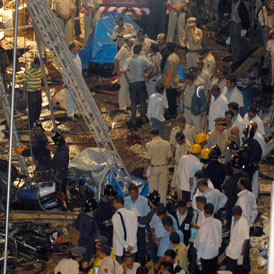Indian cities on high alert following Mumbai blasts
India’s major cities have been put on a state of high alert after three blasts shook the the country’s commercial capital, killing 18 people and injuring dozens more.
- Chapters
- descriptions off, selected
- subtitles off, selected
- captions settings, opens captions settings dialog
- captions off, selected
This is a modal window.
This is a modal window. This modal can be closed by pressing the Escape key or activating the close button.
Intelligence agencies in the country received no warnings before the three home-made bombs exploded, the biggest attack since Pakistani-based militants rampaged through India’s financial hub in 2008.
“There was no intelligence regarding a militant attack in Mumbai,” said Home Minister Palaniappan Chidambaram.
“(Maybe those) who perpetrated the attacks worked in a very clandestine manner, maybe a very small group that has not communicated with each other.”
He said it was too early to point the figure at any particular group, but suggested the co-ordinated attacks could be in retaliation for a number of plots foiled by police or for the arrests of militants, including members of the Indian Mujahideen, a home-grown group said to have support from militants in Pakistan.

Mr Chidambaram said 18 people had died in the triple attacks, lowering an earlier figure of 21. He said 23 out of the 131 injured admitted to hospital were in a critical state.
Read more: Mumbai rocked by three explosions
An improvised explosive device (IED) is thought to have been used to carry out at least one of the three blasts. Arup Patnaik, Mumbai’s police commissioner, told local television that the device had been put inside an umbrella at Zaveri Bazaar, one of the three blast sites.
Reports said an unexploded bomb was also found in Dadar West, in central Mumbai. The third blast occured at the Opera House, an area full of diamond stores in the south of the city.
The bombings were the biggest militant attack on Mumbai since the 2008 assaults which killed 166 people, raised tensions with neighbour and nuclear rival Pakistan, and left a city on edge.
It is the fifth terror attack in the financial capital in less than two decades.
There was no immediate claim of responsibility for the blasts.